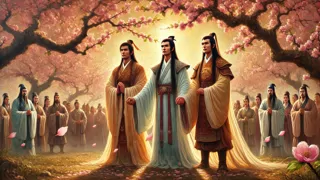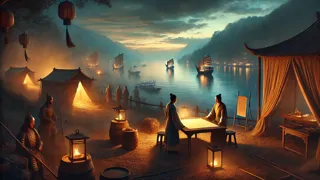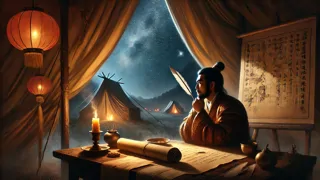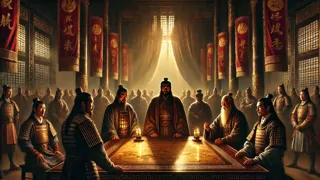Introduction
Ancient China stood on the edge of chaos. Once united under the mighty Han dynasty, the empire now fractured, trembling beneath the weight of warlords' ambitions and the thunder of armies on the march. In the waning years of the second century, the Yellow River valleys and fertile plains echoed with the clash of steel and the shouts of men who dreamed not merely of survival, but of greatness. Power flickered like a candle in the hands of the weak Emperor Xian, while across the land, heroes and schemers alike rose to shape the fate of a civilization. Three figures—Liu Bei, the benevolent scion of a royal line; Cao Cao, the cunning and ruthless master of strategy; and Sun Quan, the resolute and patient prince of the Southlands—emerged as pillars upon which destiny would rest. Their lives intertwined with legendary warriors like Guan Yu, Zhang Fei, and the brilliant Zhuge Liang, and with countless others whose loyalty, treachery, valor, and heartbreak would leave indelible marks on the tapestry of history. As alliances formed and dissolved, cities burned and fields were trampled, the hearts of the people yearned for order and justice. From mist-shrouded battlefields to candlelit war councils, from humble villages to gilded palaces, the dream of unity flickered, fragile and bright. This is the story of that dream—a saga of courage, sacrifice, and the unending search for harmony in a time of war.
I. The Twilight of the Han: Heroes Rise from Chaos
The Han dynasty, long a symbol of unity and prosperity, had become a relic, its Emperor a puppet swayed by the winds of ambition. Court officials schemed for their own gain while the common folk suffered from famine and unrest. The Yellow Turban Rebellion erupted like wildfire, its leaders rallying the oppressed with cries for justice. Across the land, the once-mighty imperial armies scattered, and warlords seized the vacuum left by failing authority.

In the north, a young scholar-official named Liu Bei lived in obscurity, his royal lineage reduced to a mere whisper. Yet, when his village was threatened by bandits and chaos, Liu Bei could not turn away. With nothing but compassion and an unwavering sense of duty, he raised a ragged banner, vowing to restore the Han and defend the innocent. Drawn by his virtue, two men joined him: Guan Yu, stoic and just, wielding the Green Dragon Crescent Blade; and Zhang Fei, fierce and loyal, whose booming voice could rout a hundred foes. Bound as sworn brothers in the peach garden, they pledged to stand together through life and death.
South of the river, Sun Jian, known as the Tiger of Jiangdong, proved his mettle by quelling rebels and securing territory for his family. Though he perished in battle, his sons—Sun Ce, bold and audacious, and Sun Quan, wise beyond his years—would inherit his dream of establishing an enduring rule in the southlands. The Sun clan's vision was rooted in family, honor, and survival, yet they would soon discover that ambition alone would not be enough to claim the future.
Meanwhile, in the heart of the northern plains, Cao Cao emerged as a master of both warfare and intrigue. Unflinching in the face of adversity, Cao Cao marshaled loyalists and opportunists alike, his eyes fixed on the ultimate prize: control of the Emperor and the mandate to rule. Under his command, the remnants of Han authority became a weapon for his own ascension. He recruited not only soldiers but minds—strategists, poets, even former enemies—understanding that true power rested in both blade and wit.
As the dust of rebellion settled, the land was divided into countless factions. Alliances shifted as easily as river currents. Some leaders, like Yuan Shao in the north and Liu Biao in Jing province, clung to their ancestral lands, unwilling to risk all in pursuit of unity. Others fell victim to betrayal or overreach. In this landscape of shifting loyalties, heroes and villains often wore the same face. The people suffered most of all, caught between armies, their fields burned and their sons conscripted into endless campaigns.
Yet from these ashes, legends grew. Tales of brotherhood, such as that of Liu Bei, Guan Yu, and Zhang Fei, spread across taverns and villages. Stories of cunning—Cao Cao outwitting rivals with feigned retreats and hidden spies—became lessons in survival. The Southlands buzzed with rumor as Sun Ce conquered with lightning speed, only to fall to an assassin's blade, leaving his younger brother Sun Quan with the burden of leadership.
Against this backdrop, the seeds of the Three Kingdoms were sown: Wei under Cao Cao in the north, Wu under Sun Quan in the south, and Shu under Liu Bei in the west. Their destinies converged, not through fate alone, but through choices—of mercy and ruthlessness, of loyalty and ambition. The world watched, holding its breath, as ancient China stood poised between ruin and rebirth.
II. War and Wisdom: Battles That Shaped a Nation
As the Han dynasty’s influence waned, China splintered further, and the ambitions of the warlords gave way to an age of ceaseless war. Armies swept across plains and rivers, banners snapping in the wind. Yet victory was seldom won by numbers alone; cunning and wisdom shaped the fate of kingdoms as much as brute strength. Nowhere was this clearer than in the epic clash at Guandu, where Cao Cao, outnumbered and outmatched, turned the tide through guile. Facing the mighty Yuan Shao, whose hosts seemed as vast as the sea, Cao Cao relied on trusted advisors like Xun Yu and Guo Jia. Supplies were cut off, ruses set in motion, and a daring night raid ignited Yuan Shao’s granaries. The battle ended with Cao Cao’s improbable triumph, solidifying his dominance in the north and earning him both fear and respect.

In the southlands, Sun Quan’s rule matured as he gathered brilliant minds to his side. Chief among them was Zhou Yu, whose mastery of both music and war became legendary. The Sun clan’s domain flourished on the banks of the Yangtze River, where shipyards echoed with the sound of hammers and markets bustled with trade. Yet peace was fleeting. The shadow of Cao Cao loomed ever closer, and the prospect of northern conquest threatened the very heart of Wu.
Westward, Liu Bei’s fortunes rose and fell with the shifting tides of alliance and betrayal. His path was never straight, marked by exile and hardship. But hope arrived in the form of Zhuge Liang—a man of rare intellect whose wisdom would become the stuff of legend. Discovered in a thatched cottage amid bamboo groves, Zhuge Liang’s entrance into Liu Bei’s service was preceded by three visits, a testament to humility and perseverance. Under Zhuge Liang’s guidance, Liu Bei’s ragtag force transformed into a disciplined army. With Guan Yu and Zhang Fei at his side, Liu Bei seized opportunity in adversity, capturing new lands and gaining the trust of those who yearned for just rule.
The balance of power reached its most dramatic point at the Battle of Red Cliffs. Here, on the broad expanse of the Yangtze, the fate of all China trembled. Cao Cao’s fleet, massive and seemingly invincible, bore down upon the alliance of Liu Bei and Sun Quan. United by necessity, their generals—Zhou Yu for Wu, Zhuge Liang for Shu—devised a plan to counter the overwhelming might of the north. On a night thick with tension, ships laden with kindling were sent drifting toward Cao Cao’s anchored fleet. Fanned by an east wind summoned—or so it seemed—by Zhuge Liang’s prayers, fire swept through the enemy ranks. Flames leapt into the sky, turning water into an inferno and forcing Cao Cao into a desperate retreat.
The victory at Red Cliffs did not bring peace, but it carved the realm into three. Wei dominated the north, Wu held the southlands, and Shu Han arose in the west under Liu Bei’s banner. Each kingdom was defined by its leader’s vision: Cao Cao’s iron will and order; Sun Quan’s stability and trade; Liu Bei’s dream of benevolence and legitimacy. Yet each bore scars from unending conflict. Families were divided by allegiance, villages erased by the passing of armies. Tales of valor abounded—Guan Yu’s famed crossing of five passes, Zhang Fei’s thunderous stand at Changban—but so too did stories of heartbreak: betrayals, executions, and the slow grinding down of hope amid endless war.
For a moment, balance seemed possible. The Three Kingdoms coexisted in a wary peace, their borders bristling with forts and spies. But ambition would not rest. Heroes grew older; legends became flesh and blood, vulnerable to loss and time. The dream of unity burned on, undimmed by years of strife. Each side prepared for the next turn of fortune’s wheel, knowing that destiny favored neither the strong nor the clever alone, but those with the courage to shape their own fate.
III. The Fall of Heroes: Sacrifice and the Price of Ambition
Years passed, and with them the fortunes of kingdoms rose and fell like the turning of seasons. The legendary heroes who had once inspired armies and awed peasants now faced challenges neither sword nor stratagem could easily overcome. Liu Bei, whose compassion had earned him the loyalty of millions, suffered a grievous blow with the loss of his sworn brother Guan Yu. Betrayed and surrounded at Jing Province, Guan Yu fought valiantly but fell in battle, his death sending ripples of mourning across Shu and igniting the flames of vengeance within Liu Bei’s heart.

Grief transformed Liu Bei. No longer content with defending his people, he resolved to avenge Guan Yu at all costs. He mustered his armies for a massive campaign against Sun Quan, seeking to reclaim Jing and punish those responsible. The ensuing Battle of Yiling was brutal—a clash of titans under a scorching summer sun. Despite his resolve, Liu Bei’s forces were devastated by Wu’s cunning general Lu Xun, whose use of fire traps mirrored the lessons learned at Red Cliffs. Defeated and heartsick, Liu Bei retreated to the city of Baidicheng. There, surrounded by loyal friends and the lingering echoes of brotherhood, he succumbed to illness, entrusting his young son Liu Shan to Zhuge Liang’s wisdom.
In Wei, Cao Cao’s reign came to an end after decades of triumph and turmoil. His legacy was one of order imposed by iron law—a tapestry woven from victories and harsh pragmatism. With his passing, his son Cao Pi seized the moment, declaring himself Emperor of Wei and ending the Han dynasty in name as well as fact. The Mandate of Heaven, once invoked to legitimize rulers, became a prize to be claimed rather than a sacred trust.
Sun Quan, now matured into a cautious and shrewd monarch, steered Wu through internal intrigue and external threats. He navigated shifting alliances with both Wei and Shu, always seeking to secure his family’s legacy and the prosperity of the southern lands. Wu’s strength lay in its rivers and fleets, its resourceful people and its leaders’ ability to endure.
With Liu Bei gone and the Han dream flickering, Zhuge Liang became the beating heart of Shu. His genius knew no bounds: he reformed administration, uplifted the people, and led daring campaigns against the north. Stories flourished of his Wooden Oxen supply carts, his Empty Fort Stratagem, and his legendary patience—waiting for the right moment to strike. Yet for all his brilliance, Zhuge Liang’s campaigns wore down both his soldiers and his health. In his final campaign against Wei, he set up his command tent beneath the starlit sky and worked deep into the night, seeking an advantage that would bring unity. He died before victory could be achieved, his passing marking the end of an era.
Across China, legends faded into memory even as new generations took up the mantle. The people remembered Guan Yu’s righteousness, Zhang Fei’s ferocity, Sun Shangxiang’s courage as a woman warrior, and Sima Yi’s quiet cunning—a man who waited in Wei’s shadows for his chance to seize power. The land was weary from war; rivers ran red and harvests failed. Yet in every corner, in every market and village square, tales of heroism and sacrifice endured. They offered hope that unity could yet be achieved—not through conquest alone, but through wisdom, compassion, and the resilience of those who refused to surrender to despair.
Conclusion
The era of the Three Kingdoms faded into history, its kingdoms swallowed by time and the relentless rise of new dynasties. Yet its stories endured—etched into bamboo slips and woven into song, whispered by elders to children beneath moonlit eaves. The courage, loyalty, and ambition that drove Liu Bei, Cao Cao, Sun Quan, and their followers left an indelible mark on China’s soul. More than the outcome of battles or the drawing of borders, it was the humanity of these figures—their flaws and virtues, their heartbreaks and triumphs—that gave their saga lasting power. Through their struggles, a divided land found not only lessons in leadership and strategy but also inspiration to persevere in the face of hardship. The dream of unity proved elusive, yet it remained ever-bright: a testament to the enduring hope that guides all nations through turmoil to peace. In every telling of this story, whether sung by riverboat minstrels or recited by scholars, the Three Kingdoms remind us that greatness is forged not in isolation but in the bonds we form, the sacrifices we make, and the courage we summon to shape our own destiny.


















